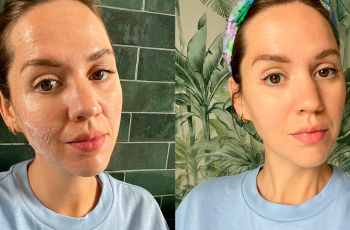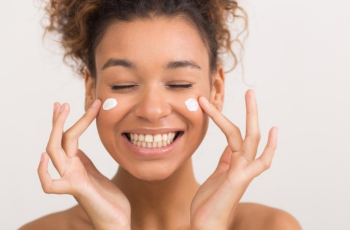
This summer, there were some interesting trends in the skincare world: Dermatologists touted retinaldehyde as superior to retinol for faster reductions in pigmentation, fine lines, and acne, while hot new injectable polynucleotide eye creams seemed to give eye creams a run for their money when it came to reducing dark circles.
Now a new season has begun, and with it come completely different trends. Fall means change, and nowhere has I noticed it more than in my skin. The combination of dropping temperatures, muggy air, and a serious vitamin D deficiency has my face falling apart — and apparently I’m not the only one.
Over the past week, “best moisturizer for dry skin,” “dry skin supplements,” and “dry face skin care” were common skincare searches. So it’s understandable that upcoming trends in the industry are designed to keep that all-important skin barrier as healthy as possible.
I don’t think anyone knows more about skin health than Kat Burki, skin expert, nutritionist, and founder and CEO of her eponymous skincare brand. Without further ado, here are the skincare trends Burki says will be big this autumn and beyond.
Reverse double cleansing
One step most skincare experts agree on is double cleansing at night. The first cleanse (usually with micellar water, oil or balm) dissolves makeup, sunscreen and everyday grime. The second cleanse (usually recommended with a gel or foam) ensures everything is completely removed.
Burki is a firm believer in double cleansing, but she reverses the steps – a trick that’s particularly helpful for dry skin. “I do it the opposite of everyone else, with the goal of deep cleansing without stripping the skin,” Burki tells me.
“I start with a cleansing gel [her KB5 Calming Gel Cleanser, £40] and then use a cleansing oil,” she says. “You don’t want to strip away the nutrients in it.” If a gel or foam cleanser leaves your skin feeling uncomfortably tight, switching up your cleansing routine and using a moisturising product can counteract that feeling.
If you have blemish-prone or oily skin, you should swap your cleansing oil or balm for a pore-friendly cream. R29 Reviews The Ordinary Sugar Lipid Cleanser is £11.10, while No7 Derm Solutions Comfort Cleanser is £14.95.
Vitamin C derivatives
If you’ve tried a vitamin C serum before and found your skin became more sensitive, irritated and dry than usual, its main ingredient is likely L-ascorbic acid, which is pure vitamin C. While it’s most effective for producing collagen and defending against environmental influences such as pollutants, it’s also very strong and some skin types can’t tolerate it.
To combat this, Burki uses vitamin C derivatives in her skin care regimen. Derivatives are essentially optimized versions of vitamin C that are more stable (ie: don’t turn a worrying orange hue and become ineffective) and significantly less irritating to the skin.
You can find STAY-C in Vitamin C Intensive Cream (£116). “This is a stable form of vitamin C that converts into ascorbic acid [pure vitamin C] in the skin,” Burki explains. Essentially, it offers all the benefits of its powerful sister product, but without the irritating, drying side effects.
If you want to spend less, consider the Inkey List C-50 serum (£16), which also contains STAY-C. The Ordinary, on the other hand, uses a vitamin C derivative called ascorbyl glucoside in its 12% Ascorbyl Glucoside Solution (£14.10).
“I’m a firm believer in derivatives because they’re less effective but work quickly,” says Burkey. In short: derivatives are the future of vitamin C – especially for dry, sensitive skin types.
The End of Collagen Skincare
Cold and hot air strip moisture from the skin, making it look dull, dry and pale. If you’re already using skincare with plumping ingredients like hyaluronic acid or glycerin and haven’t noticed any significant changes, you might be tempted by the clever marketing of collagen creams.
Our bodies naturally produce collagen; it gives the skin its firmness and structure. However, over time, collagen levels drop and our skin loses its suppleness. One downside to collagen skin care is that “it’s not possible to give back by adding collagen to the skin through a serum or moisturizer,” Burki says.
Collagen molecules are too large to penetrate the skin. Therefore, skin care products containing collagen can only provide extra moisture. Instead, Burki recommends skipping collagen skin care and incorporating a well-formulated vitamin C serum (like the one above) into your morning skin care routine to boost collagen production from the inside out.
Combine with a broad-spectrum, high-SPF sunscreen to further protect your skin from collagen-destroying UV rays. Supercharged Moisturizer. Cold weather calls for ingredients that nourish the skin barrier (the outermost layer of your skin).
Think hydrating hyaluronic acid, glycerin, and ceramides, which act like glue between skin cells to keep your skin supple. Burki recommends looking for another star ingredient this fall and winter: astaxanthin, which Burki calls a “powerful humectant.”
Studies have shown that using this ingredient topically in skin care can relieve skin issues like dryness and itching. There’s evidence that it can increase skin elasticity and reduce fine lines. But that’s not all. It also has antioxidant properties that protect the skin from pollution and UV radiation, Burki says: “It has 5,000 times the amount of vitamin C.”
Burki’s Bio Correcting Face Cream (£390) isn’t cheap, but it delivers noticeable results. Astaxanthin protects against dulling environmental factors, it’s also packed with antioxidant vitamins (C and E), hydrating squalane, redness-reducing centella asiatica, exfoliating lactic acid and another antioxidant with powerful protective properties, coenzyme Q10.
While astaxanthin is still less well-known, it can also be found in Kopari Bright, Day Sheer Mineral Sunscreen SPF 50 (£36) and Drunk Elephant Bora Barrier Repair Cream (£62).
Rethinking hyaluronic acid
Hyaluronic acid (HA) is a humectant, which means it binds to water in the skin, making it look and feel plumper. Many skincare experts recommend applying HA serums or creams to damp skin to maximise hydration. Burki, however, isn’t convinced. “You don’t necessarily have to apply HA to damp skin,” she says.
“While there are many different types [of hyaluronic acid], there is no one that meets this requirement.” New research proves this point. A study from The Ordinary found that it didn’t matter whether the Hyaluronic Acid B5 Ceramide product (£8.80) was applied to damp or dry skin; the moisture content was roughly the same.
While not all hyaluronic acid serums are created equal, using a moisturiser after a hyaluronic acid serum can be just as beneficial – and a lot easier than breaking in a serum with wet hands.
Niacinamide reduction
Niacinamide (or vitamin B3) has countless benefits for the skin: it reduces excess sebum production (thus reducing blemishes), shrinks the appearance of enlarged pores, and prevents skin from losing moisture, thus inhibiting dryness.
However, Burki says it can be stressful to go too concentrated, and it’s easy to over-concentrate. The result: rough, flaky skin.
If you want to start (or continue) using niacinamide this autumn, but your skin is on the drier side, Burki recommends dialing back on the amount and looking for skincare products that contain 2% or less niacinamide. Try the Kat Burki BioCell Correcting Serum (£240), which contains niacinamide, skin-strengthening peptides and astaxanthin.
If you want to spend less, try The Ordinary Soothing and Barrier Support Serum (£17.30), which contains 2% niacinamide and moisturizing ceramides.
A new way to exfoliate
Glycolic acid is probably the most popular chemical peel in skin care. Although it’s great at unclogging pores and reducing pigmentation, high concentrations can damage the skin barrier if overused. Therefore, Burki prefers fruit enzymes that can gently provide a similar peeling effect.
Using products with enzymes, such as a daily cleanser or serum, helps to renew skin cells and balance the biome (the good bacteria that controls the skin). Burki recommends their PH+ Enzyme Serum, £92. If you want to spend less, you can also try the Kate Somerville ExfoliKate Cleanser Daily Foaming Wash, £39, or the Coco & Eve Fruit Enzyme Cleanser, £19.
Follow-up treatments are also a must. Burki recommends leaving skin moisturized and hydrated after exfoliation with ingredients like “nourishing” ceramides.

